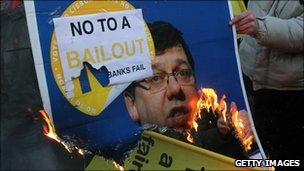 European finance ministers are to meet in Brussels to discuss the details of a bailout worth more than 85bn euros ($113bn; £72bn) for the Irish Republic.
European finance ministers are to meet in Brussels to discuss the details of a bailout worth more than 85bn euros ($113bn; £72bn) for the Irish Republic.
The representatives from eurozone countries will also be joined by those from outside - including UK chancellor George Osborne.
On Saturday thousands demonstrated in Dublin against the IMF and EU bailout, and the government's austerity budget.
It aims to resolve the country's debt crisis via tax rises and spending cuts.
Interest rates
The EU and the IMF have agreed to the financial bailout, but the ministers want to reach an outline agreement before the financial markets reopen on Monday.
Communication Minister Eamon Ryan said an outline agreement for the deal was likely to be reached by Sunday night, the Press Association news agency reported.
State broadcaster RTE had reported that the interest rate to be paid on part of the loan could be as much as 6.7%, higher than the rate charged to Greece for its bail-out, which has raised concerns from opposition parties.
But Mr Ryan said negotiations about the interest rate for any loans were still ongoing.
"It's not fixed yet and we'll have to wait and see until it's actually done.
"The overall figure has to make sense for us in that we are able to pay it back," he said.
The austerity package, announced on Wednesday by Prime Minister Brian Cowen, includes proposals to cut the minimum wage, slash the number of public sector jobs and increase taxes in order to save 15bn euros over the next four years.
It still has to go before the Dail (Parliament) before it can be passed but the budget has angered protesters.
On Saturday, the protesters marched to Dublin's General Post Office, the site of the nationalist uprising against British rule in 1916, to vent their anger.
Organisers said more than 100,000 people took part in Saturday's protest, while the Irish police (Gardai) estimated that "in the region of 50,000" were involved.
A spokesman for the Irish Congress of Trade Unions president, Macdara Doyle, told the BBC that the protest was designed to send out a clear message: "We're trying to convince government and show government that there's no support for their plan amongst civic society and that every measure they have taken to date has been exactly the opposite of what they need to do.
"Our fears about the new budget is that it's deflationary multiplied by ten. It's taking far too much money out of the economy, and whatever possible chance there is of some sort of growth taking hold in the economy will be killed by this proposed budget."
Joan Burton, finance spokeswoman for the Labour Party said the government had to secure a fair deal for Irish taxpayers at the Brussels meeting.
"From day one of this crisis, the government has prioritised the interests of the banks and their investors over the interests of ordinary people. This has to change," she said.
Sinn Fein Dail leader Caoimhghin O Caolain called on the government to end the talks and added: "No such deal to place the state in economic bondage can be binding on a future government and should not be honoured."
But Mr Cowen's government has insisted the austerity plan and next month's budget are crucial steps to show fellow members of the 16-nation eurozone that the Irish Republic is putting its finances in order.
The bailout money is expected to come from a number of different sources, with the IMF loan expected to be the cheapest money but European money likely to more expensive, particularly the money from the European Stability Facility.
The UK has offered the Irish Republic a direct bilateral loan on top of its contribution to the international funds under discussion.
Chancellor George Osborne said it was in the UK's interest to assist its neighbour and said: "Ireland is a friend in need, and we are here to help."
The crisis in the Irish Republic has been brought on by the recession and the almost total collapse of the country's banks.



